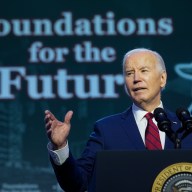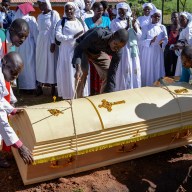TORONTO – A celebration of the 40-year anniversary of mankind’s “giant leap” to the moon was tinged with some regret Monday over Canada’s missed opportunity to be the first to Lunar walk.
“It was a frustrating moment,” said Jim Floyd, the chief designer of the Avro Arrows. “It could have been us.”
The ceremony, commemorating the past and future of Canadian innovations in aerospace, was staged at a hangar in Toronto’s Downsview Park and included such illustrious former astronauts as Dr. Roberta Bondar and Bjarni Tryggvason, who was a payload specialist on the U.S. space shuttle in 1997, as well as a message recorded by Canadian astronaut Robert Thirsk who is currently one of two Canadians orbiting the International Space Station.
Some in the group lamented that Canadians might have been first on the moon if the Avro Arrow project had survived.
The innovative plan to build a supersonic jet was cancelled a decade before the auspicious Apollo 11 landing. The government of prime minister John Diefenbaker called off the project to build what some said would have been the world’s fastest jets after pressure mounted about the cost to the public.
A team of 25 senior engineers from Avro Canada subsequently went to NASA to form a group of 33 Canadian engineers who helped the Americans put the first man on the moon.
Owen Maynard and John Hodge were among those engineers who migrated from Avro to NASA. Along with Floyd, they were honoured with the space pioneer award.
As chief of the systems engineering division on the Apollo program, Maynard, who died in 2000, worked on the design of Apollo’s lunar module. Hodge became one of four mission control leaders at NASA, after serving as a flight director on the Apollo programs.
“John Hodge and Owen Maynard were both important parts of the remarkable team that helped to make the voyage of Apollo 11 a resounding success,” said a letter from former astronaut Buzz Aldrin, who was on the mission.
Wayne Barrett, chairman of the Canadian Air and Space Museum, said many people aren’t even aware that Canadians played a role in putting man on the moon.
“Most people are familiar with the Apollo 11 mission, when man first stepped on the moon back on July 20, 1969, but they don’t know of the instrumental role that Canadians have played,” he said.
Jim Floyd, a spry 95-year-old, was one of three recipients of the inaugural Canadian Air and Space Pioneer Award for his role in developing the Avro jetliner, Avro Arrow and CF-100 jet fighter.
With his cane in one hand and the heavy award in the other, Floyd delivered a passionate speech about the potentials for Canadian space exploration on a stage flanked by models of the Avro Arrow and the Silver Dart, the first plane to take flight in Canada 100 years ago.
“We had one of the best teams ever assembled anywhere. It’s so sad that so many of them now have flown off the planet,” he told a crowd of about 100 space enthusiasts.
“Although (the government) destroyed the hardware and tried to destroy the evidence that the projects had ever existed, they could not destroy the technical knowledge we had gathered,” said Floyd.
“The abandonment of those highly professional and integrated teams was a great loss to Canada, especially at a time when Canada was acknowledged to be among the world leaders in state-of-the-art aircraft and jet engine design.”
Joshua Rossetti, 12, a volunteer at the museum, came to the ceremony dressed in a shirt and tie, prepared with books about Bondar and Floyd and a Sharpie to get his heroes’ autographs.
“I went on a tour here and I liked it so much, I asked if they were hiring,” he explained.
With sparkling eyes and an excited grin, he waited patiently to speak to his hero, Bondar.
She credited the interactive Air and Space Museum with helping to educate a younger generation about the dynamic Canadian achievements.
“I didn’t have this when I was growing up,” she said.
“Really, I had to look to the stars, but now we have people on Earth who can make it even more real. I think the greatest thing is to be in the history book and still be alive.”
Rossetti said he hopes he has the right stuff to one day become a pilot or an astronaut himself.
Floyd shook Rossetti’s hand and leaned in to offer the young protege some words of wisdom: “You can’t do better than joining the cadets.”
















